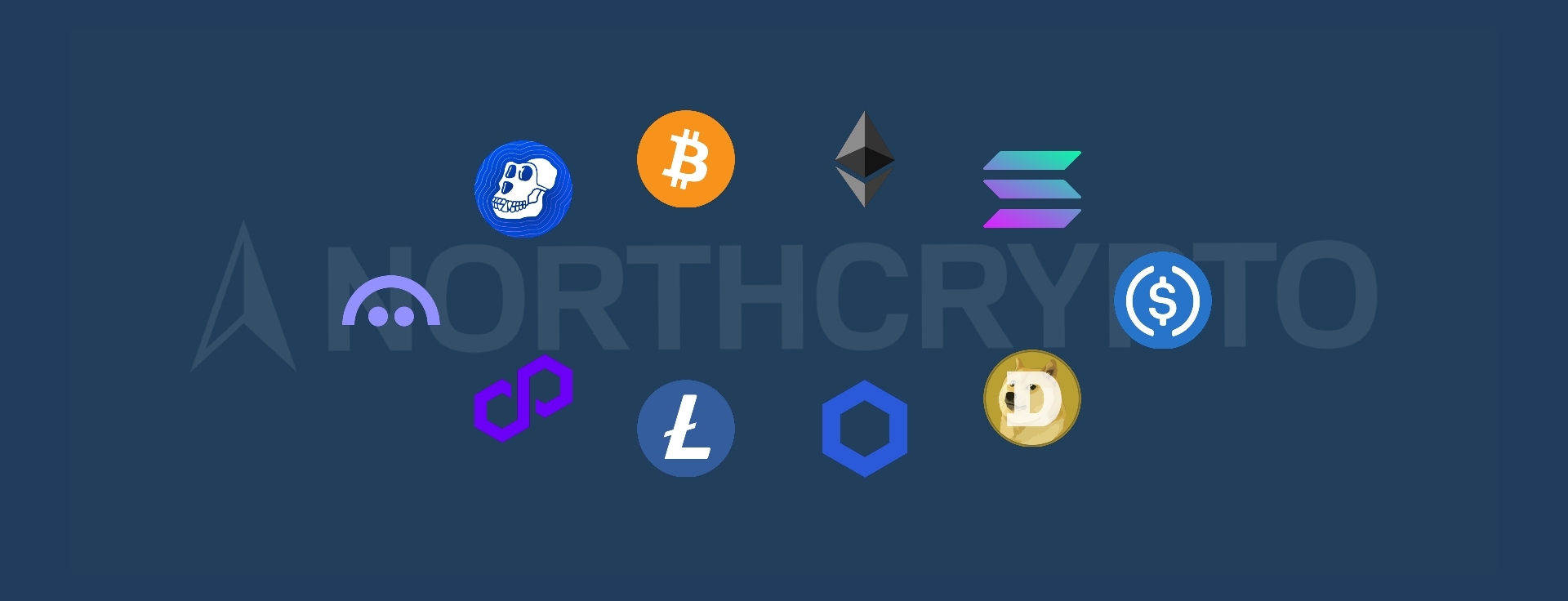Monthly report of December
Investing
This monthly report examines the most important cryptocurrency news in December and delves into the entry of several banks into the cryptocurrency market.
December in the cryptocurrency market
December was a red month for cryptocurrencies, meaning that prices of several cryptocurrencies fell during December. Of the cryptocurrencies offered by Northcrypto, the best of the month was Aave, whose price ended almost the same at the end of the month as at the beginning of the month. On the other hand, the prices of Bitcoin, Ethereum, and Chainlink decreased by around 20% in December, while the price of Litecoin dropped by around 30%. The decline in prices was due to, among other things, general uncertainty due to the new coronavirus variant. In addition, the decline in cryptocurrency prices was exacerbated by the liquidation of various leverage positions. Liquidation refers to the forced sale of a leveraged position so that the investor's account balance does not go negative. Several forced sales, in turn, lead to forced sales of more and more positions, and such a chain reaction often results in a sharp price spike, as seen in the price charts of several cryptocurrencies, for example, on the night between the 3rd and 4th of December.
Banks are coming into the cryptocurrency market
In December, the most significant cryptocurrency news was related to traditional banks. The cryptocurrency news related to banks came from Germany, Switzerland, Russia, the United States, and Colombia, among others.
There was news from Germany about cryptocurrency plans of as many as three banks. Sparkasse told about plans to offer the opportunity to trade Bitcoin and Ethereum possibly starting in 2022. In addition, Sparkasse is developing its own cryptocurrency wallet in which its customers could store cryptocurrencies. Sparkasse is a leading German banking group of more than 400 savings banks with around 50 million customers and managing around € 1 trillion in assets. In addition to Sparkasse, also Commerzbank and Volksbank und Raiffeisenbank announced plans to launch cryptocurrency services. The plans of these banks include the possibility of trading cryptocurrencies directly through the bank. Both of these banks are among the largest in Germany.
The Swiss news was related to SEBA Bank, which specializes in cryptocurrencies. SEBA Bank intends to use Aave’s institutional lending platform Arc. Aave Arc differs from Aave's main platform, for example, in that it is a closed protocol that can only be used by operators who have been white-listed and have passed the KYC, i.e. know your customer procedure. In December, SEBA Bank announced that it had applied for permission to get white-listed. According to SEBA Bank, there has been a growing interest from institutional actors in DeFi protocols such as Aave in recent months.
Also, there was progress in Russia regarding cryptocurrencies as Sberbank, the largest bank in Russia and Eastern Europe, announced that it is launching the country's first cryptocurrency-related ETF. Sberbank's ETF is an ETF consisting of shares of companies related to blockchain technology. It includes shares of the cryptocurrency exchange Coinbase and the cryptocurrency-focused investment company Galaxy Digital, among others.
In the U.S., credit unions are coming to provide cryptocurrency services. In December, The NCUA, which regulates credit unions in the U.S., announced that credit unions can team up with third-party crypto service providers to allow their members to buy, sell, and hold digital assets - as long as certain conditions are met. However, soon after that, several credit unions across the U.S. sought approval to hold cryptocurrencies directly without third parties, according to Bloomberg, which specializes in financial news and data. In the U.S., credit unions manage a total of approximately € 1.8 trillion in assets. NYDIG, a Bitcoin company working in cooperation with credit unions, expects as many as hundreds of credit unions to launch cryptocurrency-related services by next summer.
There was also news from South America when the Colombian bank Bancolombia announced that it had begun cooperating with the U.S. cryptocurrency exchange Gemini. As a result of the partnership, some of Bancolombia's customers will be able to trade four cryptocurrencies, including Bitcoin, Ethereum, and Litecoin. The cooperation between Gemini and Bancolombia is part of the Colombian financial market regulator SFC's cryptocurrency pilot program. Bancolombia is the largest bank in Colombia and it has more than 16 million customers.
Using bitcoin as collateral
We got also news from the U.S. related to several Wall Street banks and the use of bitcoin as collateral for loans. According to information received by CoinDesk, Goldman Sachs as well as several other major U.S. banks are exploring the possibility of using bitcoin as collateral for loans. The target group for these loans would be institutional actors in particular.
There was also positive news from Canada regarding the use of bitcoin as collateral. Ledn, a Canadian provider of Bitcoin-related loan services, said it is the first to launch bitcoin collateralized mortgages. It is possible to obtain a mortgage equal to the value of the bitcoin holdings and the loan is collateralized by the purchased house in addition to the bitcoin holdings. Initially, Ledn's bitcoin collateralized mortgages will be available for Canadians and Americans.
If bitcoin becomes more widely accepted as collateral for loans in the future, it will likely be a good thing for its price development. In that case, for example, an actor in need of euros does not have to sell bitcoins, as it is possible to use bitcoin as collateral for the euro loan instead of selling it. In addition, the possibility of using bitcoin as collateral for loans would improve its position, especially in the eyes of larger institutional actors.
Summary
2021 was the first year when banks worldwide began to become significantly more involved in the cryptocurrency market. The entry of dozens of banks shows that several banks have noticed an increased interest from their customers in cryptocurrencies. These banks have also realized that the risk of being excluded from cryptocurrencies or joining there among the last is greater than the risks associated with providing cryptocurrency services. Furthermore, the entry of banks, which are generally considered to be quite conservative actors, indicates that cryptocurrencies are gradually establishing their position among equities and other asset classes.
Ville Viitaharju
Cryptocurrency specialist
Last updated: 14.03.2022 13:37



